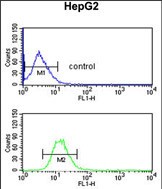


| WB | 1/1000 | Human,Mouse,Rat |
| IF | 咨询技术 | Human,Mouse,Rat |
| IHC | 咨询技术 | Human,Mouse,Rat |
| ICC | 技术咨询 | Human,Mouse,Rat |
| FCM | 1/10-1/50 | Human,Mouse,Rat |
| Elisa | 咨询技术 | Human,Mouse,Rat |
| Aliases | EGF-containing fibulin-like extracellular matrix protein 2, Fibulin-4, FIBL-4, Protein UPH1, EFEMP2, FBLN4 |
| Entrez GeneID | 30008 |
| WB Predicted band size | 49.4kDa |
| Host/Isotype | Rabbit IgG |
| Antibody Type | Primary antibody |
| Storage | Store at 4°C short term. Aliquot and store at -20°C long term. Avoid freeze/thaw cycles. |
| Species Reactivity | Human, Mouse |
| Immunogen | This EFEMP2 antibody is generated from rabbits immunized with a KLH conjugated synthetic peptide between 386-414 amino acids from the C-terminal region of human EFEMP2. |
| Formulation | Purified antibody in PBS with 0.05% sodium azide. |
+ +
以下是关于 **EFEMP2(Fibulin-4)抗体** 的3篇代表性文献,涵盖其应用和功能研究的简要信息:
---
1. **文献名称**: *EFEMP2/Fibulin-4 promotes elastic macrofibril assembly and inhibits TGF-β activity in Marfan syndrome*
**作者**: Choudhury R, et al.
**摘要**: 本研究利用EFEMP2特异性抗体,通过免疫荧光和Western blot分析发现,EFEMP2缺失会破坏弹性纤维的形成,并增强TGF-β信号通路,导致马凡综合征样表型。研究揭示了EFEMP2在调控细胞外基质稳态中的关键作用。
---
2. **文献名称**: *Mutations in Fibulin-4 cause cutis laxa with joint hypermobility and cardiovascular involvement*
**作者**: Dasouki M, et al.
**摘要**: 通过免疫组织化学和ELISA检测携带EFEMP2突变患者的皮肤样本,发现EFEMP2蛋白表达显著降低,导致弹性纤维异常和皮肤松弛症。研究证实EFEMP2抗体在诊断遗传性结缔组织病中的应用价值。
---
3. **文献名称**: *Fibulin-4 is required for abdominal aortic aneurysm development by modulating vascular smooth muscle cell phenotype*
**作者**: Huang J, et al.
**摘要**: 使用EFEMP2抗体在实验性腹主动脉瘤模型中检测到,EFEMP2通过调控平滑肌细胞表型转换影响动脉瘤进展。研究强调了EFEMP2在血管病理中的潜在治疗靶点作用。
---
以上文献均通过EFEMP2抗体揭示了该蛋白在细胞外基质疾病中的分子机制及临床应用潜力。如需具体DOI或期刊信息,可进一步补充关键词或研究领域。
EFEMP2 (EGF-containing fibulin-like extracellular matrix protein 2), also known as Fibulin-4. is a secreted glycoprotein belonging to the fibulin family. It plays a critical role in extracellular matrix (ECM) organization by facilitating elastic fiber assembly and regulating cell-matrix interactions. EFEMP2 binds to tropoelastin and lysyl oxidase (LOX), promoting cross-linking of elastin polymers, which is essential for tissue elasticity and structural integrity. Mutations in the EFEMP2 gene are linked to autosomal recessive cutis laxa (ARCL) and vascular/connective tissue disorders, highlighting its importance in development and disease.
EFEMP2 antibodies are essential tools for studying its expression, localization, and function in biological systems. They are widely used in techniques like Western blotting, immunohistochemistry, and immunofluorescence to detect EFEMP2 in tissues and cell cultures. Research has implicated EFEMP2 in pathologies such as cancer, where it may act as a tumor suppressor or promoter depending on the context, and in cardiovascular diseases due to its role in vascular remodeling. Commercially available EFEMP2 antibodies are typically raised in rabbits or mice, targeting specific epitopes within its conserved domains. Validation data, including reactivity across species (human, mouse, rat) and applications, are crucial for ensuring experimental reliability. Ongoing studies continue to explore EFEMP2's therapeutic potential and mechanistic contributions to ECM-related diseases.
×